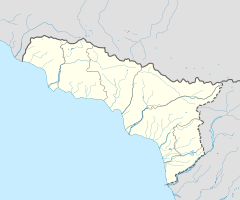Kamani massacre
This article needs additional citations for verification. (October 2020) |
| Kamani massacre | |
|---|---|
| Part of Georgian-Abkhaz conflict and the ethnic cleansing of Georgians in Abkhazia | |
 The village of Kamani. Most of its inhabitants were massacred by Abkhaz separatists during the war. | |
| Location | Kamani, Abkhazia, Georgia |
| Coordinates | 43°03′29″N 41°02′37″E / 43.057965°N 41.043731°E |
| Date | July 9, 1993 |
| Target | Georgians |
Attack type | Armed attack |
| Deaths |
|
| Perpetrators |
|
The Kamani Massacre took place on July 9, 1993, during the
Events
During the
However, the area was very important strategically, as it enabled motorized units to reach Sukhumi, the capital of the autonomous republic. After the failed attempt to storm Sukhumi from the west, the Abkhaz formations and their allies diverted their offensive on the northern and eastern sides of Sukhumi. On July 2, 1993 under the Russian military directives and naval support, the Abkhaz and their allies (

The Georgian forces who were protecting the pathways to Kamani were annihilated early in the morning after which the main assault on the village was undertaken at 10 a.m. Within a couple of hours the village fell to Abkhaz separatists and their allies. Soon after the Abkhaz and their allies started a violent rampage against the inhabitants of Kamani. Women, children, and the elderly were systematically tortured, raped and massacred during the two days of violence.[2] The church and convent in Kamani became the scene of a blood bath.[2] The female nuns were raped and later killed in front of the orthodox priest father Yuri Anua and father Andria (the overseer of the convent). After witnessing the massacres of nuns the Georgian priests were taken outside of the church and while kneeling were interrogated.
“They questioned father Andria on the ownership of land in Abkhazia. He refused to answer. They questioned him repeatedly and finally he gave up and said: Abkhazia, like the rest of the world, belongs to God. They shot him soon after. Before doing so, they forced a young Abkhaz priest to kill him. He resisted and was killed near the Georgian priest. They left their corpses near the church and left".[3]
After the July events of 1993, Kamani remains completely depopulated and all houses in the village are abandoned by the surviving inhabitants. After taking this strategic area, Abkhaz and their allies launched a large scale offensive on Sukhumi which by now was encircled by the separatist forces.
See also
- Ethnic cleansing of Georgians in Abkhazia
- Georgian-Abkhaz conflict
- Sukhumi Massacre
- United Nations resolutions on Abkhazia
References
- ^ The Conflict in Abkhazia: Dilemmas in Russian 'Peacekeeping' Policy by Dov Lynch
- ^ a b Conflict in the Caucasus: Georgia, Abkhazia, and the Russian Shadow by S. A. Chervonnaia and Svetlana Mikhailovna Chervonnaia, p 51
- ^ UN report on Human Rights violation during the Georgian-Abkhaz conflict, Video interview with the survivor of the Massacre, recorded by UNAMIG in Tbilisi, 1995

